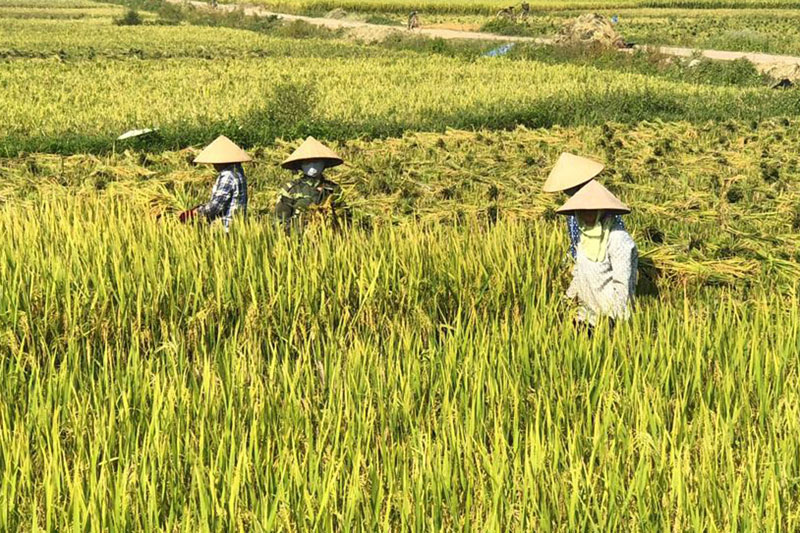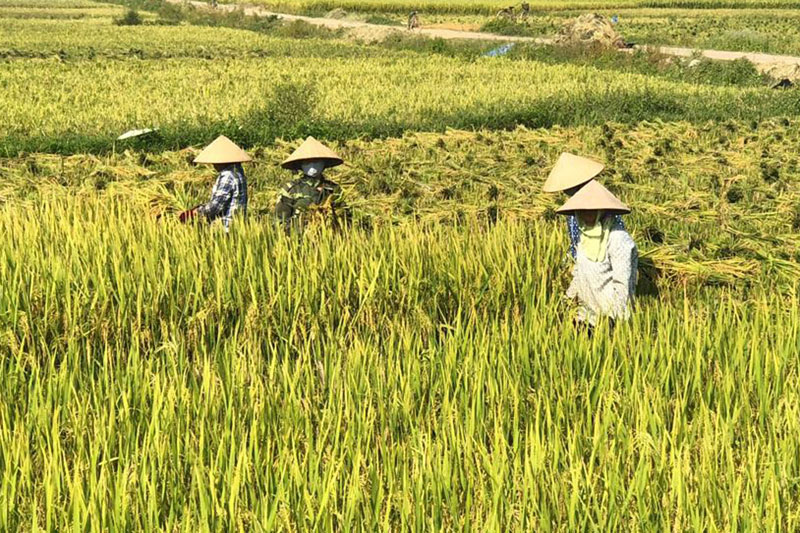
(HBO) - J02 is originated Japanese rice that was brought to the highland areas of Da Bac district. With suitable climate and soil favorable conditions, the rice is of excellent quality, not only sticky and fragrant, but also bold taste to eaters.

Farmers in Ban Ha hamlet, Muong Chieng
commune (Da Bac) are harvesting J02 rice in spring crop.
Ms. Xa Thi Thuy in Na Nguom village is with
her husband and daughter harvesting J02 rice of spring season. Ms. Thuy said:
In the past, these people often grew the varieties of 838 or BC15 purebred
rice, etc. These varieties’ yields are equal to or less than Japanese rice
variety, the rice is quite harder and needed to handle with pests. Since we
used the J02 seedlings, those drawbacks have been overcome. Especially, when
the rice are cooked, it is sticky, tasty and soft, which is more suitable to
the customers’ tastes.
Being tested of growing in Muong Chieng
commune about 4 years ago, J02 is a pure Japonica rice variety originated from
Japan which was imported and selected by the Institute of Agricultural
Genetics, Vietnam High Technology joint Stock Company had the monopoly to
export and distribute. At that time, the model was implemented in 4 hamlets of
Na Muong, Na Nguom, Ban Ha and Na Phang with 50 households. The farmers in the
model said that this is high quality rice of superiority. The production
process after 8 seasons, the farmers find that the rice grows and develops
well, the stiffness of the rice, the resistance to be bended, cold resistance
and pest resistance are all good, with
higher yield than some other pure variety, the average productivity is 65
quintals / hectare.
At present, J02 rice variety has been found
in many fields of this upland district from Dong Chum, Muong Chieng, Giap Dat,
Tan Pheo to Doan Ket, Cao Son, Hao Ly and Tu Ly, etc. This confirms the
achievement and expansion of the model.
The District People's Committee has also
developed and submitted procedures for J02 specialty rice to be certified as a
collective mark. At present, the consumption market of this kind of rice is
wide open, with large consumer demand. J02 rice is in harvesting crop, ending
the growing time of 135 - 140 days. At the district's agricultural stall
located in Dong Tien Ward (Hoa Binh city), customers are crowded to come and
buy J02 rice with the price of 20,000 VND / kg.
According to data from the Hoa Binh Provincial Party Committee, the industrial production index for the first six months of 2025 is estimated to have increased by 20% compared to the same period last year. This marks the highest year-on-year growth rate for this period since 2020.
In the first six months of 2025, Hoa Binh province’s export turnover was estimated at 1.145 billion USD, marking an 18.11% increase compared to the same period in 2024. Import turnover was estimated at $ 804 million, a 17.15% increase, which helped the province maintain a positive trade balance.
The lives of the ethnic minority farmers in Tan Lac district have gradually improved thanks to the new directions in agricultural production. This is a testament to the collective strength fostered through the professional associations and groups implemented by various levels of the district’s Farmers’ Union.
With the motto the "product quality comes first,” after nearly one year of establishment and operation, Muong village’s Clean Food Agricultural and Commercial Cooperative, located in Cau Hamlet, Hung Son Commune (Kim Boi district), has launched reputable, high-quality agricultural products to the market that are well-received by consumers. The products such as Muong village’s pork sausage, salt-cured chicken, and salt-cured pork hocks have gradually carved out a place in the market and they are on the path to obtaining the OCOP certification.
In the past, the phrase "bumper harvest, rock-bottom prices" was a familiar refrain for Vietnamese farmers engaged in fragmented, small-scale agriculture. But today, a new spirit is emerging across rural areas of Hoa Binh province - one of collaboration, organisation, and collective economic models that provide a stable foundation for production.
Maintaining growing area codes and packing facility codes in accordance with regulations is a mandatory requirement for agricultural products to be eligible for export. Recently, the Department of Agriculture and Environment of Hoa Binh province has intensified technical supervision of designated farming areas and packing facilities to safeguard the "green passport" that enables its products to access international markets.



